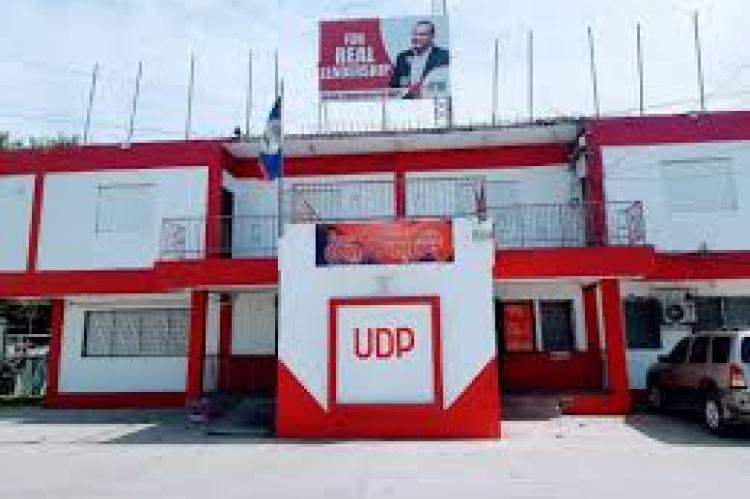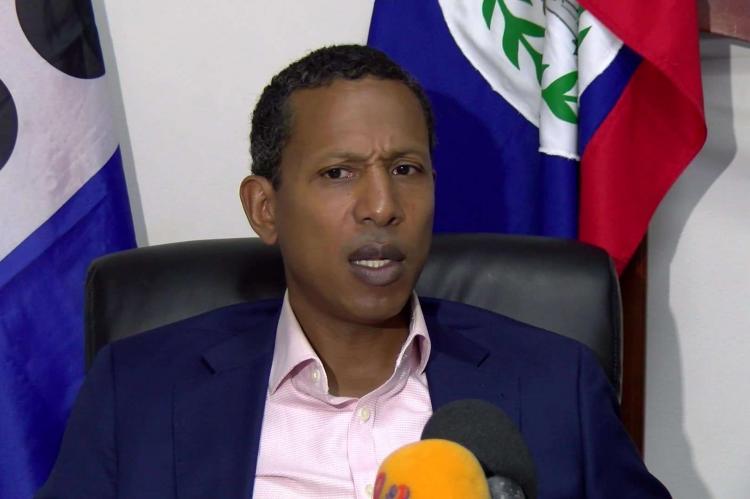"Unity or Anarchy? The UDP's Internal War Threatens Its Path to the 2025 Elections"
By: Omar Silva
Editor: National Perspective Bz DIGITAL 2024
Belize City, 29th October 2024
The United Democratic Party (UDP) finds itself at a critical juncture as internal power struggles threaten to dismantle its credibility ahead of the 2025 General Election. Following a contentious Unity Convention that saw Tracy Panton emerge as the leader, tensions have escalated, leading to an unprecedented standoff at the UDP’s Belize City headquarters. Panton’s faction, the Alliance for Democracy, claims overwhelming support, citing a 66% delegate mandate from the Unity Convention. However, the legitimacy of her leadership remains in dispute, with the current Leader of the Opposition, Shyne Barrow, and his supporters refusing to recognize the Alliance’s authority.
The power struggle came to a head recently when Panton’s faction occupied the lower floor of the UDP’s headquarters, only to be met with police intervention. Commissioner of Police Chester Williams underscored the legal nuances of the situation, reminding all involved that without a court-sanctioned eviction order, no faction holds absolute authority over the party's assets. This intervention, meant to maintain order, has exposed the severe fissures within the UDP as both sides contest each other’s legitimacy.
The Unity Convention, UDP’s Formal Stance, and Its Aftermath
Tracy Panton’s rise to leadership, despite resistance from Shyne Barrow’s camp, was bolstered by notable figures from the UDP’s past administrations, including Anthony “Boots” Martinez and John Saldivar. For Panton and her supporters, the convention result signifies a clear shift in leadership, with Panton asserting, "The people have spoken." In response, her team has taken assertive steps to solidify this mandate, including occupying party headquarters and changing locks—a symbolic act met with resistance from Barrow loyalists.
Adding to the controversy, UDP Secretary General Michael Peyrefitte issued a formal statement to Police Commissioner Chester Williams, asserting that Philippa Griffith Bailey—who granted Panton access to party headquarters—was never a trustee of the UDP and thus has no authority over the party’s assets. The UDP maintains that it holds sole ownership of the headquarters, transferred to the party by the government in 2010. According to Peyrefitte, Bailey, a former Secretary General, resigned from the UDP in 2013, relinquishing any claim over party assets at that time. UDP Deputy Chairman Alberto August has since filed a police report against Panton and Alliance members, accusing them of trespassing and property damage at the headquarters.
Peyrefitte’s letter went on to denounce Panton’s “fraudulent actions,” arguing that her Alliance for Democracy Party is dishonestly asserting rights over UDP assets despite Panton’s formal expulsion from the UDP. The UDP leadership reaffirmed its unity within its primary faction under Party Leader Shyne Barrow, Deputy Leader Hugo Patt, and Chairman Michael Peyrefitte.
Public Perception and Political Risks
With just over a year until the next general election, the UDP’s public image risks being severely compromised. The unfolding saga at the headquarters has captured public attention, raising questions about the party’s stability and leadership. In a political landscape where unity is a valued asset, the UDP’s apparent disarray may deter voters and give the ruling People’s United Party (PUP) a strategic advantage.
Moreover, the police presence at the headquarters, coupled with visible conflicts among UDP leaders, may convey an image of instability and chaos that could alienate undecided voters. The UDP's base may be disheartened by these events, potentially dampening voter turnout among supporters who feel disillusioned by the party’s infighting.
Legal Ambiguity and the Role of the Trustee
The legal dimensions of this conflict add another layer of complexity. Panton’s entry into the UDP headquarters was reportedly authorized by Philippa Griffith Bailey, the building's trustee. However, Commissioner Williams raised concerns about whether Bailey’s authority alone was sufficient under the UDP constitution, which calls for multiple trustees. As he noted, "The legal process cannot be circumvented by some other process," and emphasized that without full trustee approval or court intervention, such authorization remains on shaky ground.
Panton and her legal team maintain that they have the right to occupy the UDP headquarters. However, the commissioner has recommended legal recourse, suggesting that the trustee issue a formal notice to quit, followed by an eviction order if Barrow’s supporters refuse to vacate.
Risks of Fragmentation as Election Nears
The UDP's internal crisis poses serious risks to its ability to rally support ahead of the 2025 elections. Barrow, as the constitutionally recognized Leader of the Opposition, retains legal standing within the House of Representatives, a position reinforced by Commissioner Williams. Meanwhile, Panton’s faction, emboldened by her Unity Convention victory, is pushing forward as the UDP’s new face. However, both factions claiming leadership jeopardizes the UDP’s credibility as a unified opposition force.
The Alliance for Democracy, with its coalition of influential figures, represents a push for change within the UDP, yet risks alienating traditional supporters who view the conflict as a reckless display of disunity. This infighting undermines the UDP’s primary role as a united opposition against the PUP, who could capitalize on the UDP’s disorganization by rallying voters under a message of stability and continuity.
A Path Forward or a Path to Oblivion?
For the UDP, the stakes could not be higher. As the struggle for control continues, both factions face the prospect of damaging the party’s reputation beyond repair. The UDP has traditionally been the PUP’s primary rival, yet its present infighting could erode its standing among voters who are increasingly weary of political instability. If the dispute remains unresolved, the party risks entering the 2025 election as a fractured entity, unable to mount a credible challenge to the ruling PUP.
In the coming months, the UDP’s leaders will need to consider legal arbitration to settle the leadership question decisively. A prolonged standoff could shift public sentiment irreparably, driving voters to seek alternative representatives who promise stability.
As the police maintain their neutral stance, keeping the peace between the two factions, the UDP faces a pivotal moment in its history. Whether it emerges from this crisis as a united front or succumbs to political disintegration remains to be seen. For now, the public watches closely, as the UDP’s future hangs in the balance.
- Log in to post comments



